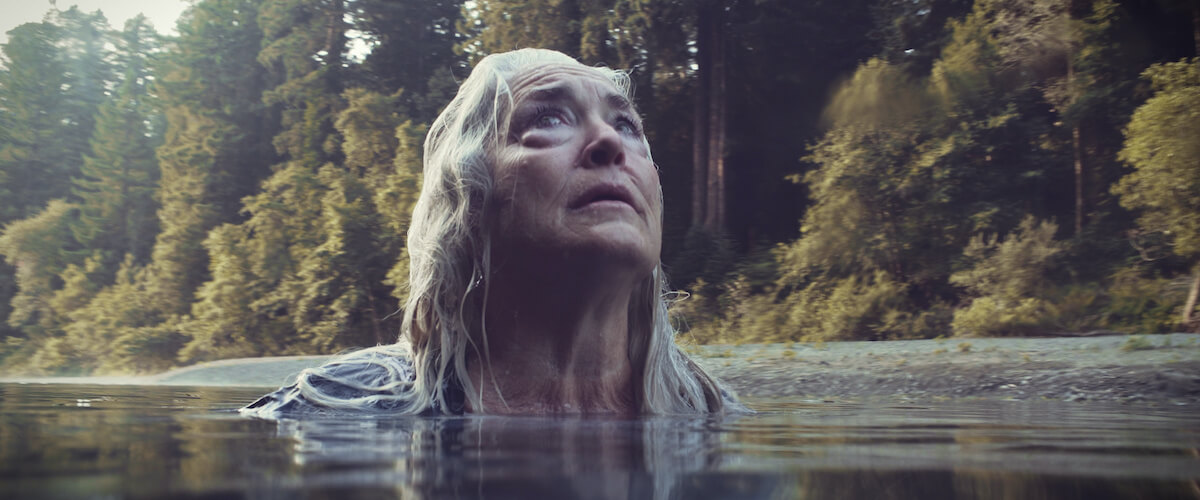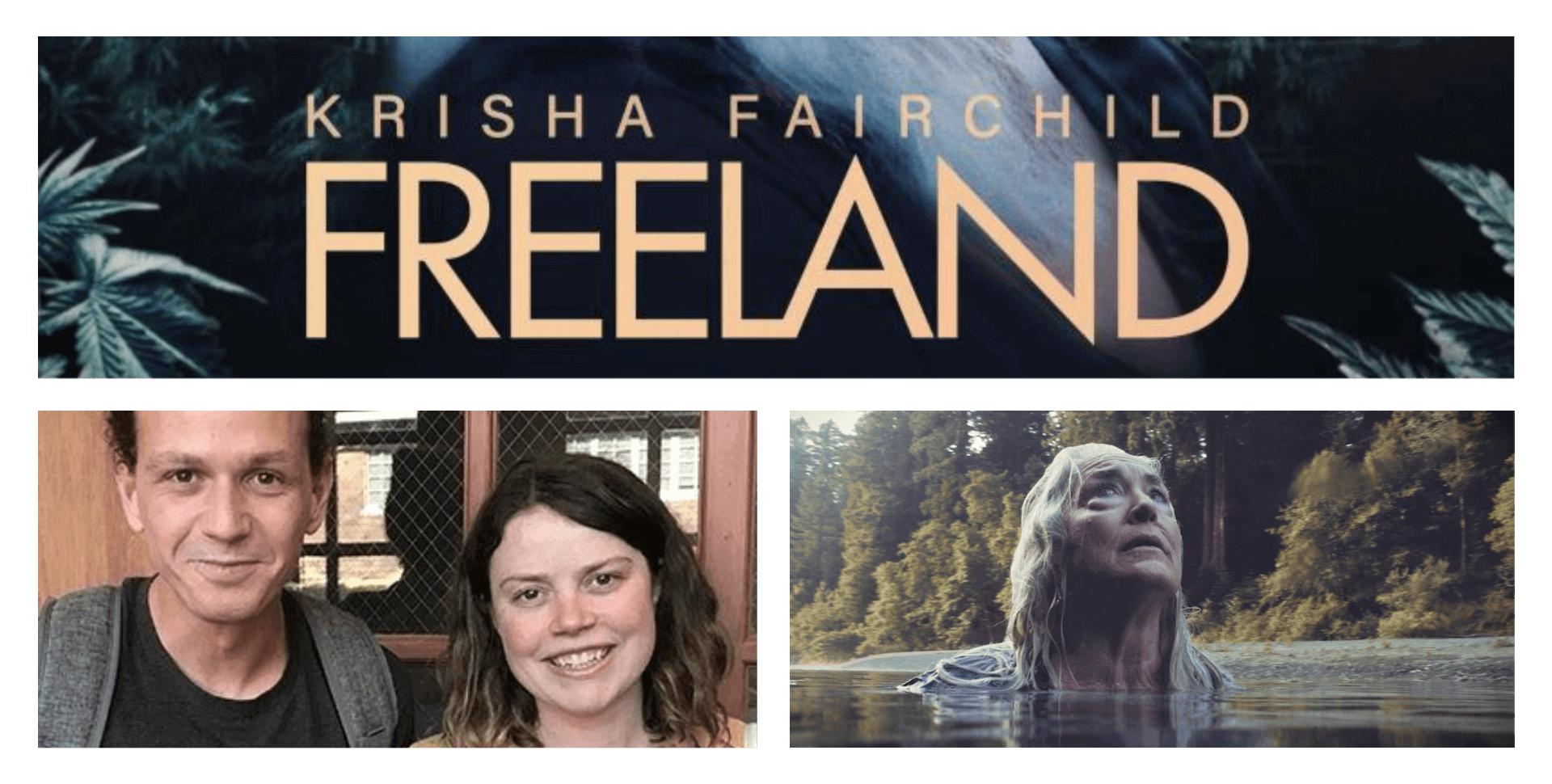Freeland is a 2020 drama film featuring Krisha Fairchild as Devi — a small pot farmer who finds her world shattered as she has to scramble against time to bring in what could be her final harvest.
Read our interview with the writers and directors of Freeland Mario Furloni and Kate McLean on the various elements of the filmmaking process.
Watch Freeland via Amazon
What was the inspiration for Freeland, and what was it like working together to write the screenplay?
MF: Kate and I met ten years ago in journalism school, and we made a documentary together called Pot Country telling the story of the arrival of the hippies in a small logging community in Northern California, the discovery of pot-growing, and the benefits and problems it brought to the area. Shortly after we started working on a scripted story that would eventually become Freeland. We knew we wanted to tell a really simple story that showed the perverse effects of legalization on small growers. Writing the script was a process of doing a lot of research, and then learning what worked and what didn’t in a fictional story. We probably wrote dozens of different versions, and each time we tried to make it simpler, to distill the story to its essential elements.
Krisha Fairchild was phenomenal as Devi — displaying profound vulnerability and strength on screen. What was it like casting the film?
MF: She is incredible, isn't she? We feel terribly lucky to have found such an amazing collaborator. We were searching for our Devi at the time when the film “Krisha” was out in festivals. Such a great film and she was just so amazing in it. So we had initial talks with Krisha then and immediately felt like it would be a great fit. We started a long period of emailing ideas back and forth and dreaming up the character together. One benefit of our project having many false starts over the years leading to actually getting made was that we had this long incubation period to build the character with Krisha. She told us that there was a time when she almost chose that life for herself, so the Devi character felt like a path-not-taken for her. So I think she felt good bringing a lot of herself to the part. But that said, she’s just so incredible at her craft, she could pull off anything.
Devi's descent into the final scene is sad but understandable. She must admit defeat and start over to survive. What happens to Devi after the credits roll? What, if anything, do you hope for audiences to think or feel after watching Freeland?
KM: We wrote a version of the script where we alluded to what might be next for her, but ultimately we came to the conclusion that the specifics are less interesting than that very elemental decision to continue. The humiliation and liberation of starting over. The moment when the thing you were most afraid of turns out not to be the worst-case scenario, and you can see that clearly for the first time.

It was a beautifully shot film. Mario, as you handled the cinematography, could you tell us about the visual element of the film, Freeland?
MF: Oh thanks! I guess we approached the whole project in a very documentary, materials-available way, and like everything else in the film, we wanted the visual style to stay very simple and unfussy. That simplicity was really our guiding principle: what’s the essence of the scene, how can we communicate that as economically as possible? We knew we were going to be using mostly natural light, so it was really a collaborative process of finding the right locations and the right time of day to shoot the scenes and then blocking it together in a way that felt as natural and simple as possible.
What was it like working with Composer William Ryan Fritch on the Freeland score?
MF: Will is a longtime collaborator of ours and a close friend, so the process of working together on the film was particularly rewarding. He started composing really early on, even before we shot, and we tried many different styles and moods until we settled on the final score. We wanted the music to blend in with the sound design (by the incredible Danish sound designer Peter Albrechtsen) and it took a lot of experimenting to get there. But Will is a music genius, and incredibly prolific. He has a shed next to his house full of crazy instruments and he makes all the music himself, looping and modifying each instrument to make it sound like nothing you’ve ever heard before. We spent many delightful days there together as he worked his magic.
What were your favorite scenes in Freeland — while on the set filming and in the final cut?
KM: The trimming scene was really fun to shoot. It was our first day with the full cast, and I was nervous about how it would all come together. We were filming on a real working farm, and I had not realized the location would be in use by a team of trimmers rushing to process a bunch of weed that day. Luckily, they welcomed us into their space, and we hung out for a bit and then shot the scene with them working alongside the actors. Getting the opportunity to hang out with this great group in their very fun and chill workplace really set the tone for our scene. The way real people and a real place offered up all this magic really did inspire the way we approached the shooting that came after.
Where was the movie filmed, and how long did the production last?
KM: We shot in southern Humboldt County, in Northern California, in real homes and farms, over the course of 21 days.
Which films/directors have influenced you as a filmmaker, including Freeland?
MF: We watched a lot of Andrea Arnold, Dardenne brothers, Mike Leigh, Kelly Reichardt...
What are some of your favorite movies from the past decade?
MF: Dogtooth, Stories We Tell, The Wonders, Rams, Neighboring Sounds, The Kid with a Bike, Stranger by the Lake.
Which themes and subject matters interest you as a filmmaker?
MF: I’m interested in how people square their ideals and self-image with how they actually live in the world. Like our character Devi, she finds it so hard to adapt to the shifting economic landscape, because her whole world is built around being a black-market grower, a rebel of sorts, and she can’t square it with the new reality.
Do you have any other upcoming projects you’d like to share?
MF: Yeah, we have a few different irons in the fire, including a genre feature set in the Brazilian rainforest, and a series exploring the early years of pot growing in California set in the 1980s.
Watch Freeland via Amazon

